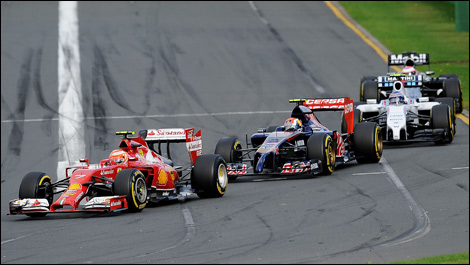Aug
7th
Stay connected Subscribe to our RSS feed
From GMM
Daniil Kvyat, the youngest rookie in formula one, has hit back at suggestions formula one drivers lack the hero status of the sport's past stars.
Amid the sport's struggle to fill grandstands and boost television ratings in 2014, many have pointed the finger at the drivers for failing to compete in the charisma and courage stakes with greats like Villeneuve, Senna and Mansell.
F1 legend Michael Schumacher's manager Willi Weber, for example, this week hit out at the "wimps" that today fill the grand prix grid.
20-year-old Russian rookie Kvyat, however, thinks it is wrong to suggest that today's F1 drivers lack courage.
"In my opinion F1 remains one of the sports in which courage is most relevant," he told Italy's Omnicorse.
"I don't like to hear that the modern driver is no longer a knight of risk -- that compared with the 80s we are not real men," the Toro Rosso driver insisted.
"That's all bullsh*t," said Kvyat.
"All that separates us from 340kph and the wall is our brakes and a hundred metres of asphalt," he exclaimed. "Risk in formula one cannot be erased, but it is right that we do everything possible to improve the safety of the tracks and the cars."
Another criticism made by Weber this week, and echoed by many others, is that greats like Schumacher, Senna and Villeneuve gave "their answer on the track" rather than to their engineers on the radio.
But Kvyat argues: "With the new regulations, the role of the engineer is essential -- the management of electrical energy cannot be controlled only by the driver.
"Let's clarify another thing," he added. "If there is the possibility to overtake, the driver must always try it. There is never the situation when the engineer tells you to forget it, to wait.
"But at the same time we need to adapt to the situation of fuel consumption and the wear of the tires."
As for the suggestion that the grands prix today are boring, Kvyat also argues his case.
"I don't know what people are expecting," he said. "I have looked at the grands prix and I have to say that the show is not bad at all.
"Sure, some races are more exciting than others, but if we go back to the races in the 2000s they were dominated by one driver -- what was so spectacular about that?
"Maybe the public has not understood the rule changes we have done, but I am sure we have taken the right path," Kvyat continued. "It took courage to change to experimental solutions in order to progress normal road cars."
Finally, when asked what rule change he would instigate immediately to improve F1, Daniil Kvyat answered: "I would wait a little longer. It seems to me that the package we have now is not so bad."
Daniil Kvyat, the youngest rookie in formula one, has hit back at suggestions formula one drivers lack the hero status of the sport's past stars.
Amid the sport's struggle to fill grandstands and boost television ratings in 2014, many have pointed the finger at the drivers for failing to compete in the charisma and courage stakes with greats like Villeneuve, Senna and Mansell.
F1 legend Michael Schumacher's manager Willi Weber, for example, this week hit out at the "wimps" that today fill the grand prix grid.
20-year-old Russian rookie Kvyat, however, thinks it is wrong to suggest that today's F1 drivers lack courage.
"In my opinion F1 remains one of the sports in which courage is most relevant," he told Italy's Omnicorse.
"I don't like to hear that the modern driver is no longer a knight of risk -- that compared with the 80s we are not real men," the Toro Rosso driver insisted.
"That's all bullsh*t," said Kvyat.
"All that separates us from 340kph and the wall is our brakes and a hundred metres of asphalt," he exclaimed. "Risk in formula one cannot be erased, but it is right that we do everything possible to improve the safety of the tracks and the cars."
 |
| Daniil Kvyat (Toro Rosso) fighting against Kimi Raikkonen (Ferrari), Valtteri Bottas (Williams) and Jenson Button (McLaren). (Photo: WRi2) |
Another criticism made by Weber this week, and echoed by many others, is that greats like Schumacher, Senna and Villeneuve gave "their answer on the track" rather than to their engineers on the radio.
But Kvyat argues: "With the new regulations, the role of the engineer is essential -- the management of electrical energy cannot be controlled only by the driver.
"Let's clarify another thing," he added. "If there is the possibility to overtake, the driver must always try it. There is never the situation when the engineer tells you to forget it, to wait.
"But at the same time we need to adapt to the situation of fuel consumption and the wear of the tires."
As for the suggestion that the grands prix today are boring, Kvyat also argues his case.
"I don't know what people are expecting," he said. "I have looked at the grands prix and I have to say that the show is not bad at all.
"Sure, some races are more exciting than others, but if we go back to the races in the 2000s they were dominated by one driver -- what was so spectacular about that?
"Maybe the public has not understood the rule changes we have done, but I am sure we have taken the right path," Kvyat continued. "It took courage to change to experimental solutions in order to progress normal road cars."
Finally, when asked what rule change he would instigate immediately to improve F1, Daniil Kvyat answered: "I would wait a little longer. It seems to me that the package we have now is not so bad."
 The latest auto news, reviews, prices, product and vehicle releases.
The latest auto news, reviews, prices, product and vehicle releases.